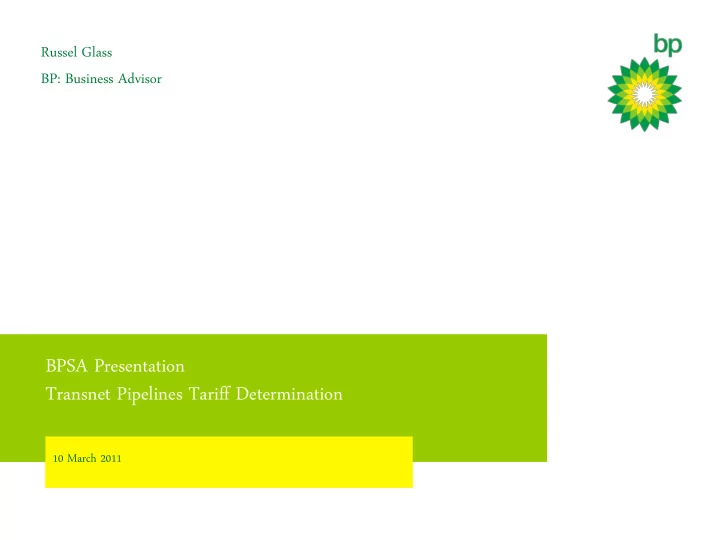

Russel Glass BP: Business Advisor BPSA Presentation Transnet Pipelines Tariff Determination 10 March 2011
Nersa Approach – Rolled-in tariff model BP welcomes the decision by Nersa to address the anti-competitive and • negative macro-economic effect of unique tariffs as reflected in the “rolled - in” approach Setting a uniform tariff rate for all pipelines will eliminate pipeline cost • disparities for product supplied to the inland market Product moved via the COP will no longer be at an advantage to product • moved via the DJP The NMPP once commissioned, will compete on a level playing field with the • COP and DJP The “rolled - in” tariff approach will also ensure that the DJP and NMPP • compete on a level playing field and thus promote the efficient utilization of these pipelines BP welcomes the decision by Nersa to remove the tariff differential between • the crude oil pipeline (COP) and the product pipelines (DJP/NMPP) 2
Tariff Benchmarking The draft determination fails to adequately consider the consequences of the • proposed magnitude of the tariff increase for 2011/12 and likely further exceptional increases until 2013/14 BP has consistently argued for local pipeline tariffs to be benchmarked • against their international counterparts BP has extract further information on pipeline tariffs from the US that provides • similar results to the 2009 study presented previously Data on pipeline tariffs in the US is freely available as these tariffs are set by • the US regulator (FERC) and published on the websites of the pipeline operators 3
Tariff Benchmarking It is recognized that this approach faces numerous challenges as the sample size is limited to only a • few pipelines and the analysis does not take into account operational issues This analysis serves to support BP’s proposal that Nersa conduct a thorough investigation into global • pipeline tariffs in order that the proposed Transnet Pipeline tariffs many be reasonably benchmarked 4
Locational Advantage • The import parity pricing principle – used to underpin the locational advantage - is based on an assumption of competitive markets • The market for inland product transportation is a monopoly • Consequently, the locational advantage is derived from monopoly rents that are manifested in the pipeline tariff proposal • The simple point is that on a globally competitive basis, these tariffs are not justifiable and therefore cannot themselves be used to justify the locational advantage We would urge Nersa, as an organ of the State, to take a position on the matter rather than be silent on the competitive and macro- economic effects of the proposed tariff increase 5
Macro-economic impact Nersa’s limited economic impact assessment fails to address the key macro-economic • issues appropriately It would appear that Nersa have failed to comprehend the marginal cost argument and • have therefore erroneously concluded that model competition is of little consequence Nersa’s argument that the increase in the petrol price is only a small fraction of the GDP • is misleading − Based on a first order affect the tariff increase will have the consequence of destroying a significant number of jobs in the inland market − The impact on employment creation is dependent on a number of factors including the propensity of the recipient of the tariff proceeds to invest in the local economy − Where these recipients have a high propensity to invest offshore the said tariff increase could result in local consumers diverting funds to offshore employment creation We would urge Nersa to conduct a comprehensive macro-economic impact assessment of the proposed tariffs 6
Thank You & Questions 7
Recommend
More recommend